Prayer
Heavenly Father, I thank and praise you for this new day of life. I do not deserve the least of your kindnesses and benefits, and yet day after day your mercies are new every morning. Great is your faithfulness. Lord, as you have in your faithfulness sustained my physical life, I pray and ask that you may renew and sustain my spiritual life this morning. As I read your word, please open my eyes that I may see wonderful things in your law. I’m a stranger on earth, do not hide your commandments from me; and my soul breaks with longing for your law at all times. Be merciful to me, O Lord, speak, wash me by the renewing of the water of your word. I pray in Jesus’ name, Amen.
Reading
Gen 1:24-31.
“And God said, “Let the earth bring forth living creatures according to their kinds—livestock and creeping things and beasts of the earth according to their kinds.” And it was so. 25. And God made the beasts of the earth according to their kinds and the livestock according to their kinds, and everything that creeps on the ground according to its kind. And God saw that it was good. 26. Then God said, “Let us make man in our image, after our likeness. And let them have dominion over the fish of the sea and over the birds of the heavens and over the livestock and over all the earth and over every creeping thing that creeps on the earth.” 27. So God created man in his own image, in the image of God he created him; male and female he created them.
28. And God blessed them. And God said to them, “Be fruitful and multiply and fill the earth and subdue it, and have dominion over the fish of the sea and over the birds of the heavens and over every living thing that moves on the earth.” 29. And God said, “Behold, I have given you every plant yielding seed that is on the face of all the earth, and every tree with seed in its fruit. You shall have them for food. 30. And to every beast of the earth and to every bird of the heavens and to everything that creeps on the earth, everything that has the breath of life, I have given every green plant for food.” And it was so. 31. And God saw everything that he had made, and behold, it was very good. And there was evening and there was morning, the sixth day.”
Meditation
As young people near the end of their first stage in their education, a common question that they might get asked is: “So, what are you going to do next?” I remember asking the same question of myself at that time, and – to be absolutely honest – I had no clear idea or direction for my life at that point. I find a similar situation when I talk to many young people today. Not many have a clear idea of where they are going and what they want to do. I’ve asked that question of High School students before: “What do you want to do after year 12?” And the answer of many is a reflection of the same answer that I gave: “I don’t know.”
Now many cultures, I’m sure, aren’t like this. Even in western culture fifty years ago, young people wouldn’t have been focusing on this kind of question. On the Saturday morning after my dad finished high school he started his plastering apprenticeship. In some Asian cultures, your options for a vocation can be determined as early as primary school depending on what grades you get. But just the same, the overarching question is still there: What should we do with our lives? What is your purpose? As we approach the close of our consideration of the image of God in man, these are relevant questions, because the fact is that there truly is a reason why you exist. There is purpose and direction to be found in this world.
As we’ve studied day six, we’ve seen a number of things. We’ve seen that the image of God is our total identity as people. It’s not so much that we carry or bear the image of God, but rather that we are the image of God. Everything that we are is reflective of something in God, we are designed to reflect his infinite glory on a creaturely level. Building on that, we went into a bit more detail of what it means for us to exist in the image of God. It means that we are spiritual beings, we are personal beings, we are relational beings designed for relationship, and we reflect this image together as male and female in the image of God.
With that overview in mind, there is one final piece of the puzzle that we need to look at in our final studies of the sixth day of creation. We can summarise this puzzle piece with a single word: dominion. That is our theme in these closing meditations, and it is a key and central aspect of what it means to say that we were made in the image of God. God himself marries the concepts of image and dominion in verse twenty six of our chapter. “Then God said, “Let us make man in our image, after our likeness. And let them have dominion over the fish of the sea and over the fish of the sea and over the birds of the heavens and over the livestock and over all the earth and over every creeping thing that creeps upon the earth.”
But what is dominion? What does it mean? And what does that mean for us in our lives? Well, there are three things I want to point out about dominion, the first of which is that we were made to rule. When we’re talking about dominion, in a very basic sense, it means that we were made to rule. It’s kind of obvious when you think about it! A dominion is an area that is under the rule of someone or something. Let’s flesh this concept out a little further.
To begin with, we must be clear about one basic thing: God rules everything. The first five days of creation demonstrate this very clearly. God makes everything and he absolutely determines everything that comes to pass. He is the sovereign, and his rule is supreme and total. Psalm 93:1 affirms this for us: “The LORD reigns; he is robed in majesty; the LORD is robed; he has put on strength as his belt. Yes, the world is established; it shall never be moved. Your throne is established from of old; you are from everlasting.” Likewise Psalm 103:19: “The LORD has established his throne in the heavens, and his kingdom rules over all.” We could spend a year meditating on the sovereign rule of God, but the plain truth is repeated in scripture again and again and again: the Lord reigns. God rules everything.
Following on from this, the scriptures teach us that man rules under God. As God gave dominion to mankind, it was not an autonomous rule but a theonomous rule. That is to say – he does not call us to rule according to our will and design, but according to his will and design. God is the rule-maker, and in giving us dominion the calling we have is to fulfill his purposes and will. This is why the Lord taught us to pray in the Lord’s Prayer: “Your will be done on earth as it is in heaven”. The world has been designed and established to run according to God’s design and law. We saw this very clearly on day four. As God set sun, moon, and stars in the sky what we saw was that God rules in his creation by using the creation itself to realise that rule. It’s exactly the same principle when it comes to man’s dominion. Just as God uses the sun moon and stars to rule the heavens, so too he uses us to rule on earth. Our dominion calling, then, is simply this: to exercise rule as God’s representatives. That’s why you’re here, to do the will of God. There is a divine law-order in creation, and we must respect, honour, and represent that order. That’s why God told Adam not to eat from the tree of the knowledge of good and evil, because he needed to recognise and submit to God’s rule.
However, something then went catastrophically wrong, because man rejected God’s rule. The problem with dominion today is that we’ve stepped outside of the original design as a race. When man fell in the garden, he rejected God’s rule, and we now live in a state of being under judgment, and in a state of rebellion against God. In other words, man can no longer take dominion as he ought. The inclination of fallen man is to live life as he sees fit (autonomy), doing what he wants rather than living to please, obey, and serve God. The shadow of eternal judgment now hangs over us, and we cannot do that for which we were created – except perhaps in a fallen, idolatrous, shadowy form.
There is good news though, because Christ restores God’s rule. There’s a reason why the gospel is called the gospel of the kingdom. The very idea of the Kingdom of God itself is another way of talking about dominion. A kingdom is a dominion, and to take dominion is to exercise rule and authority. One of Christ’s purposes in dying was to redeem us from sin, to restore us to God, and to cause us to live now as citizens of the kingdom. In other words – redemption is a restoration to the calling of dominion, that we may again rule under God.
Christ, as the second Adam, is the one now to whom all dominion belongs. As believers in Christ, he restores us to this calling to live our lives under the rule and authority of God. He restores us to life as it is meant to be – life under God, in communion with God, and in service to God. This is why Jesus talked about authority after his resurrection. At end of Matthew’s gospel, the resurrected Christ speaks to his disciples and says:“All authority in heaven and on earth has been given to me. Go therefore and make disciples of all nations, baptizing them in the name of the Father and of the Son and of the Holy Spirit, teaching them to observe all that I have commanded you. And behold, I am with you always, to the end of the age.” Why, at the climax of the gospel, would Matthew record these words? It’s because God’s intention is to re-establish dominion in the image of man through Christ – who is the man above all men.
Be ye doers of the word…
All this is very much personal, because what it means is that God now calls you to dominion. Through Christ, God is restoring his image in you, and part of that image means that you are called in every area of your life to exercise dominion rule under God, in accordance with his will. We are called as Christians to prayerfully, and in reliance upon God, bring our lives into line with God’s righteous and holy law. He would have us to exercise dominion and order in our environment – in our homes and gardens, in our workplaces, in our own hearts as we seek to mortify our sinful desires, in our vocation, in society, and – above all – in worship. God wants to see his law written on our hearts and lived out in our lives (Heb 10:16), which indeed he is accomplishing by the power of his Spirit. God calls you to dominion, he has made us for dominion to live as citizens of the kingdom, renewed in God’s image and living under God’s sovereign rule according to his will. On a practical level, what this means is that – in every area of life – we should ask the following question: What is the will of God? Every second of our lives needs to come under the scrutiny of that question.
Another part of what this also means is that God now calls us to declare Christ’s rule. As we share the good news of the gospel, in a sense we are simply declaring that Christ reigns, and that Jesus is Lord. We are called to declare that all sinners must come, repent, bow the knee, and receive forgiveness for sins and renewed life in Christ. We are emissaries of the kingdom. We are heralds of Christ’s rule. The dominion mandate has been renewed through Christ and declared in the gospel of the kingdom as Christ’s rule is renewed. In Canberra, Australia’s capital city, there are many embassies representing foreign powers. In a sense, every church and Christian family is an embassy representing God’s rule and kingdom. As we share the gospel, we call rebellious people to come back to God and to submit to his loving, gracious, and righteous rule again. The Great Commission – in a way – is the same thing as the cultural mandate of dominion, because both are focused on seeing the rule of God realised on earth as it is in heaven. The difference is that the Great Commission is fundamentally redemptive and realises Christ’s rule as the central authority in the kingdom. The original dominion mandate was only a foreshadow of that. And so we must declare Christ’s dominion, and he must reign until all his enemies have been made into his footstool. SDG.
Prayer of Confession & Consecration
Lord God, I confess to you that much of my life is governed and directed by my own rule and desires. Where I ought to have considered and changed, according to your will, I have maintained strongholds of idolatry in my heart. Lord, please forgive me for my sin, and help me – like the faithful kings of old – to tear down the idols, and to destroy the high places of my heart. Please help me to be mindful and all times and in every way to consider what your will is, and to seek and do your will. May your will be done on earth as it is in heaven, may your will be done in my life as your will is done in heaven. Please help me in this, O Lord, unless you build the house, I will labour in vain. It is you who works in your people both to will and to work. Please subdue my rebel heart, make it to be wholly yours and wholly dedicated to the service of your Son, the Lord Jesus, my King. In Jesus’ name I pray, Amen.

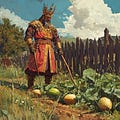




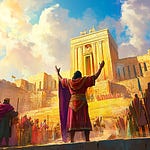
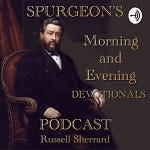

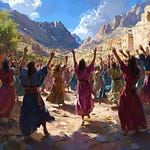

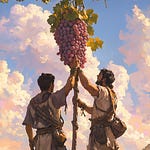

Day 34: Called to rule in the image of God (Gen 1:24-31).